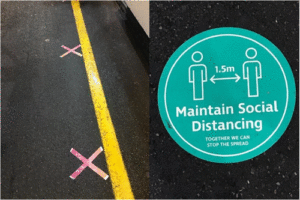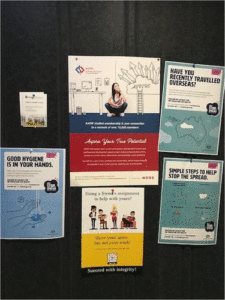
The use of COVID-19 health warnings and regulation in posters and public signage has effectively turned much of the responsibility and policing of compliance back on individuals, say sociology experts at Flinders University.
Using a wide sample of signage - some complicated, some more simple - the experts have looked at the proliferation of signs and instructions as one aspect pandemic life aiming to stem transmission and 'stay safe'.
"We found a wide range of visual ways in which the messages are communicated - often they were very simple in design, even emojis," says Matthew Flinders Distinguished Professor Sharyn Roach Anleu.

While signs provide important public health information and rely on simple language, they are normative, the researchers say. Individuals are expected - invited, requested, implored, or required - to follow new procedures and instructions, such as physical distancing or wearing a mask, and to remember older hygiene norms such as handwashing.
"And while we didn't set out to analyse their effectiveness in modifying and regulating diverse behaviour, it is apparent that their role in the pandemic has some far-reaching effects on generating and communicating new norms about personal and collective behaviour," she says.
"We have seen growth in the visual cues and signage now embedded in how we manage our COVID response." Sometimes known as 'official graffiti', such signage is one aspect of social regulation.

"The effectiveness of all these signs may rest in them giving ordinary people legitimacy to ask others to comply with the instructions and even change their behaviour," says co-author Monash University researcher George Sarantoulias, also from the Flinders University College of Humanities, Arts and Social Sciences.
"While the signs don't usually rely on formal law administration, the enforcement therefore becomes part of every-day, ordinary social interaction," he says.
These simple instructions anticipate individuals will be motivated to stem the spread of the disease for their own health and the collective benefit, the research concludes.
The article, 'Complex data and simple instructions: Social regulation during the Covid-19 pandemic' (2022) by Sharyn Roach Anleu and George Sarantoulias has been published in the Journal of Sociology (Sage) DOI: 10.1177/14407833211066926






